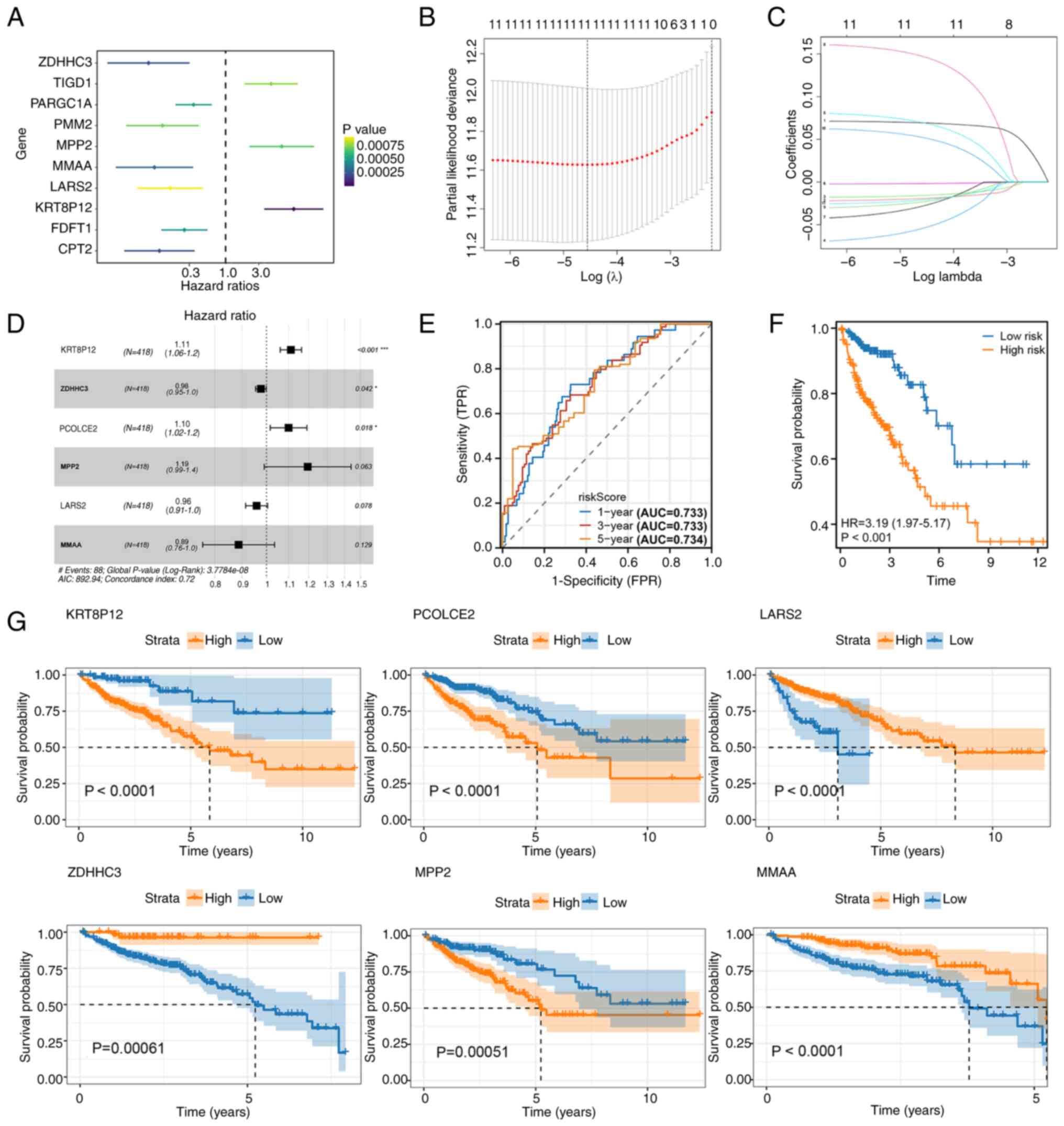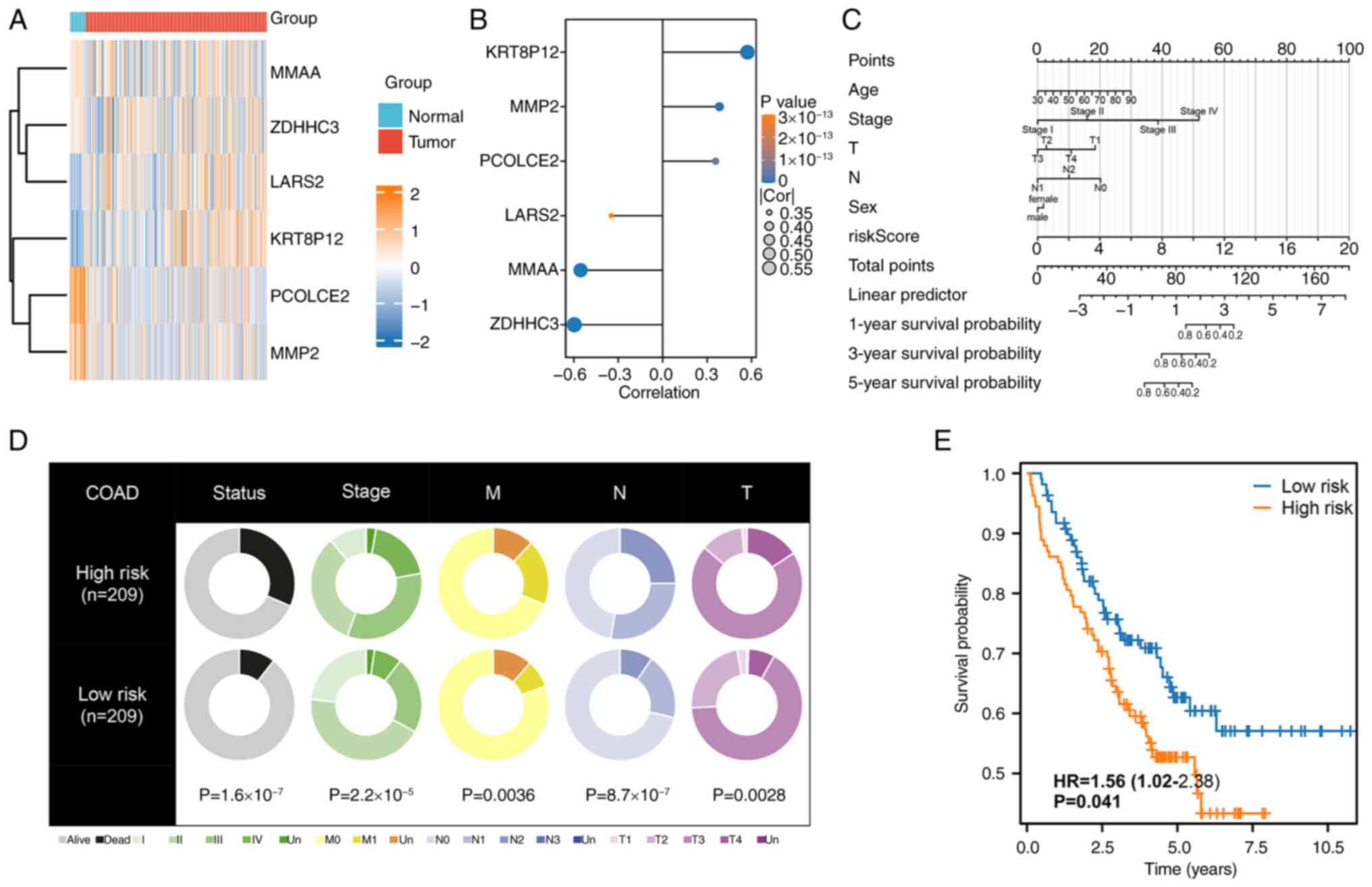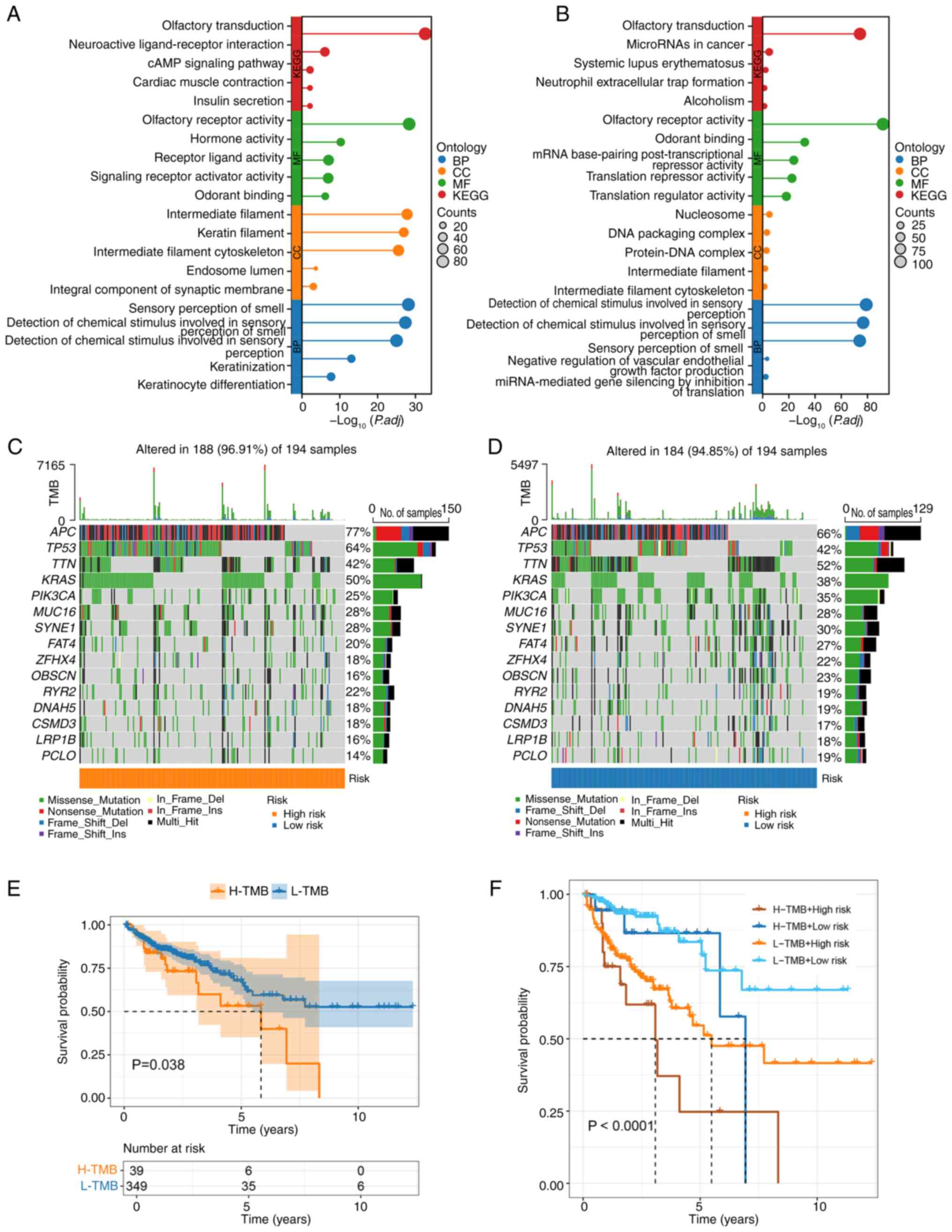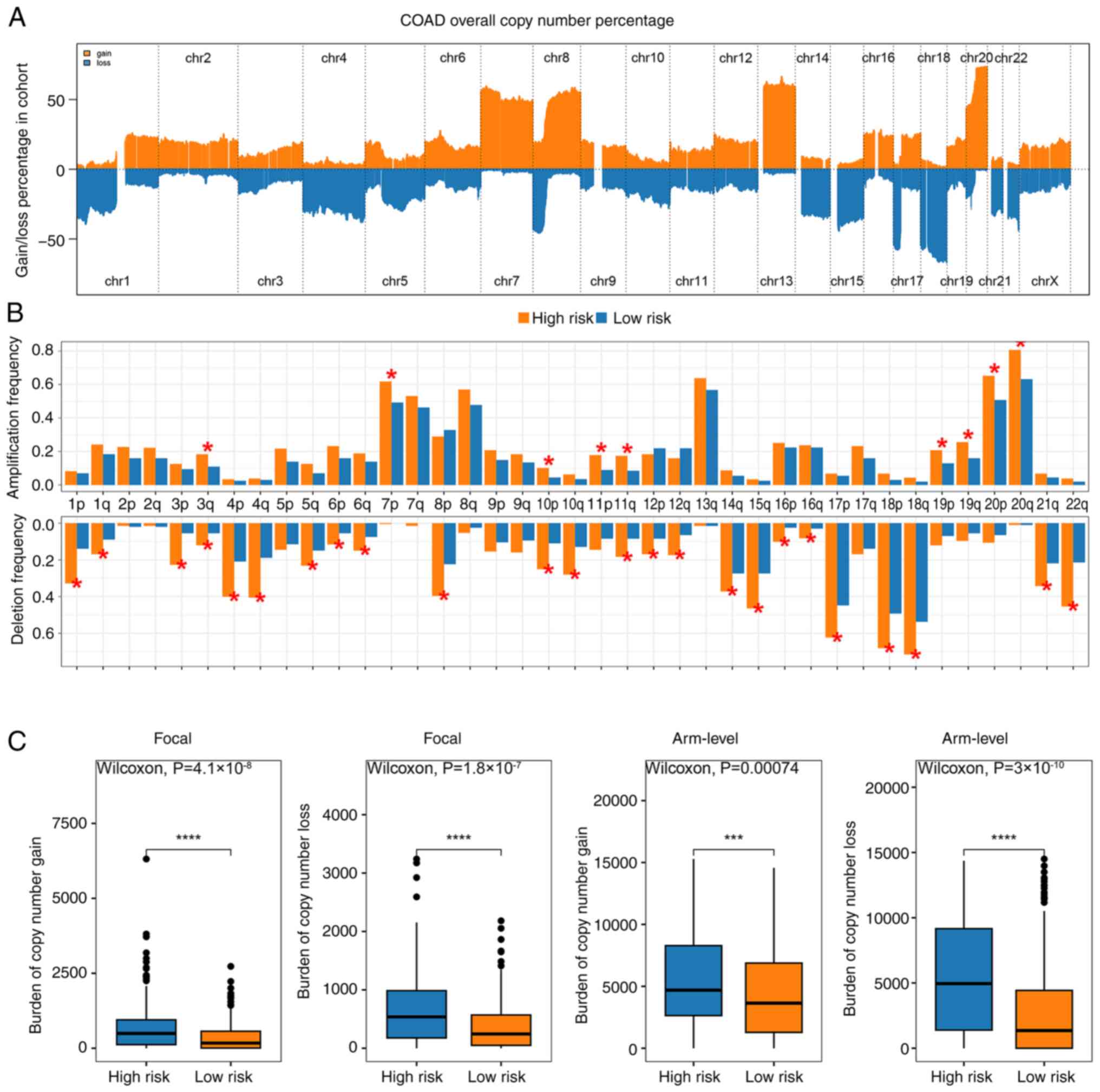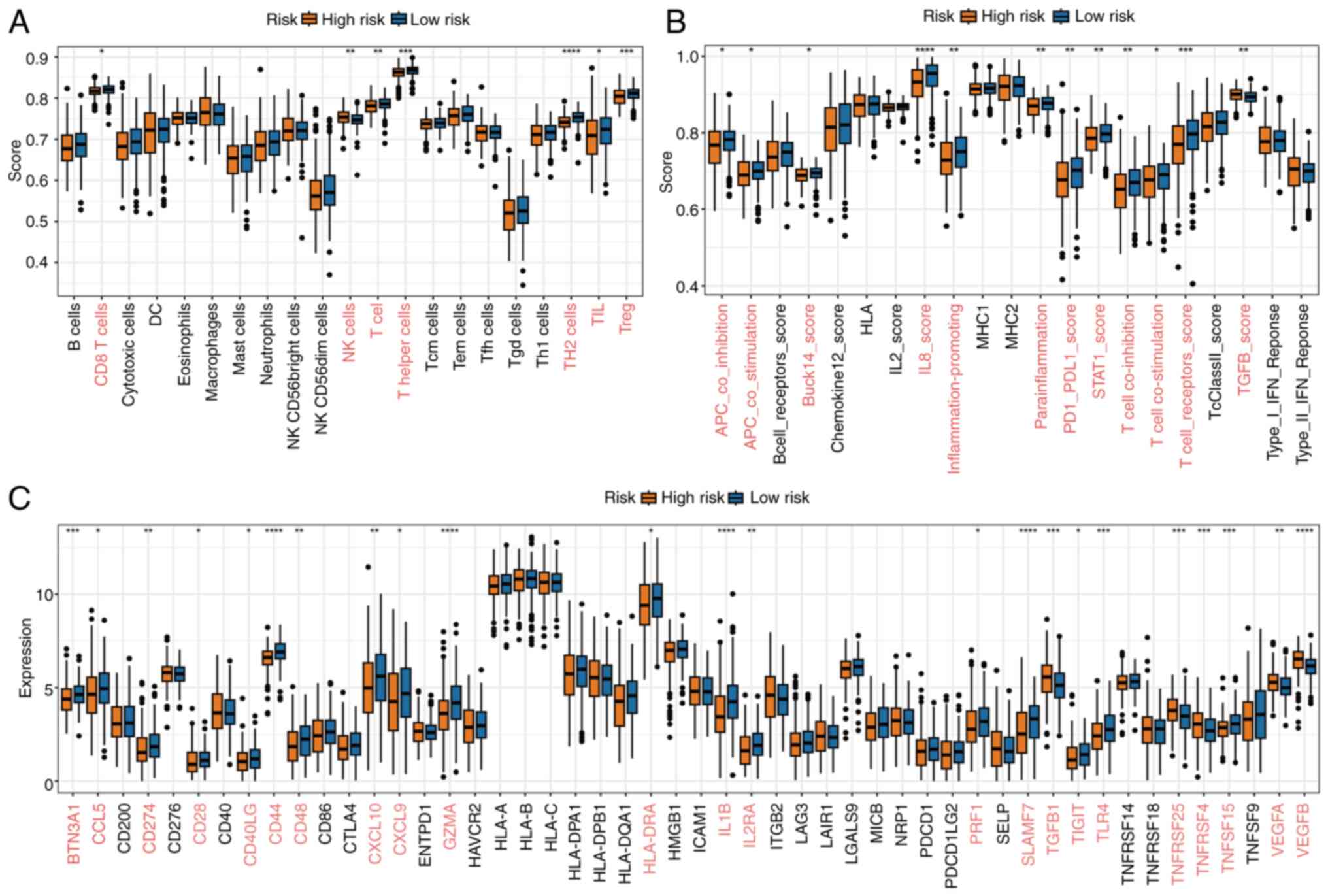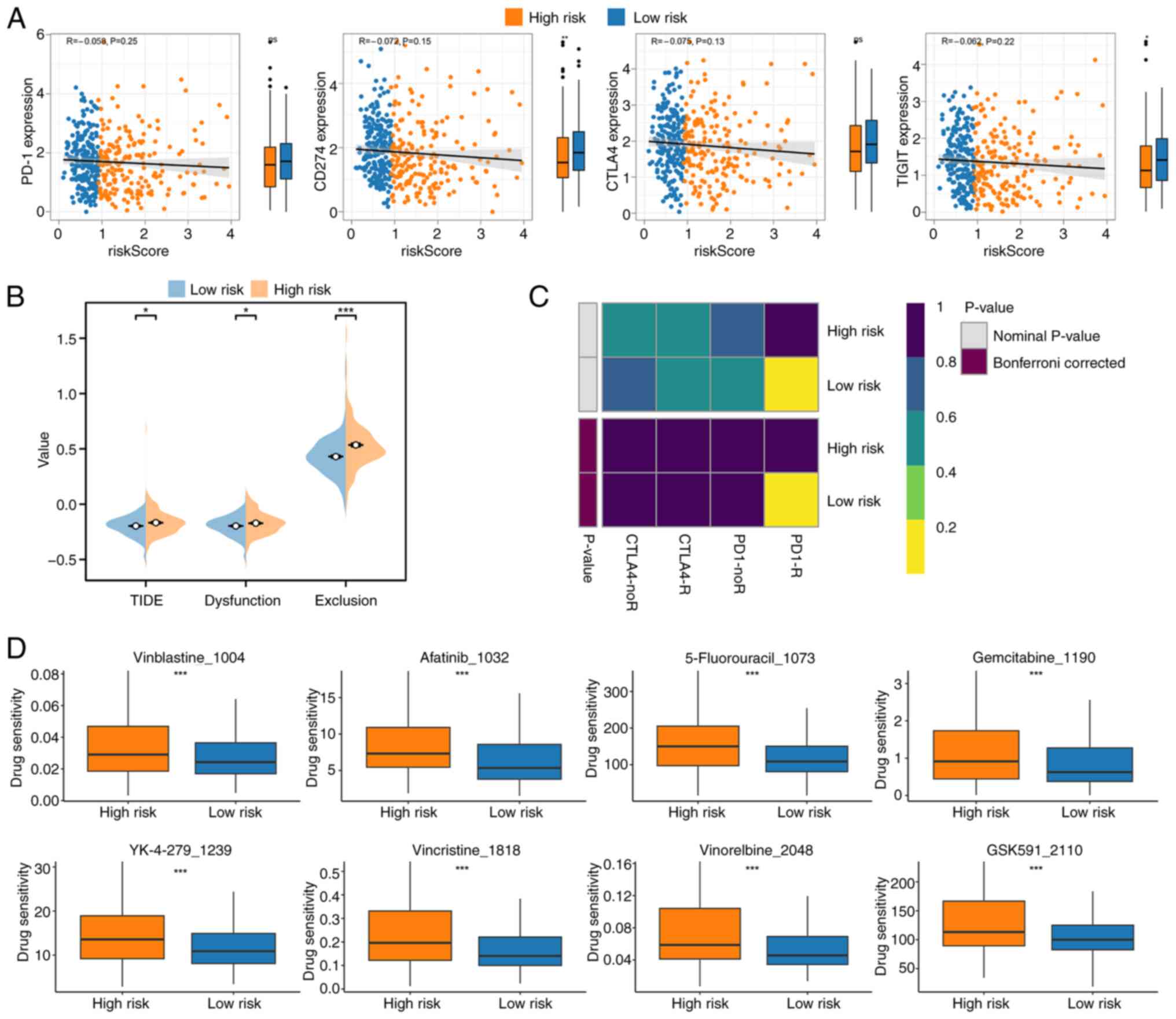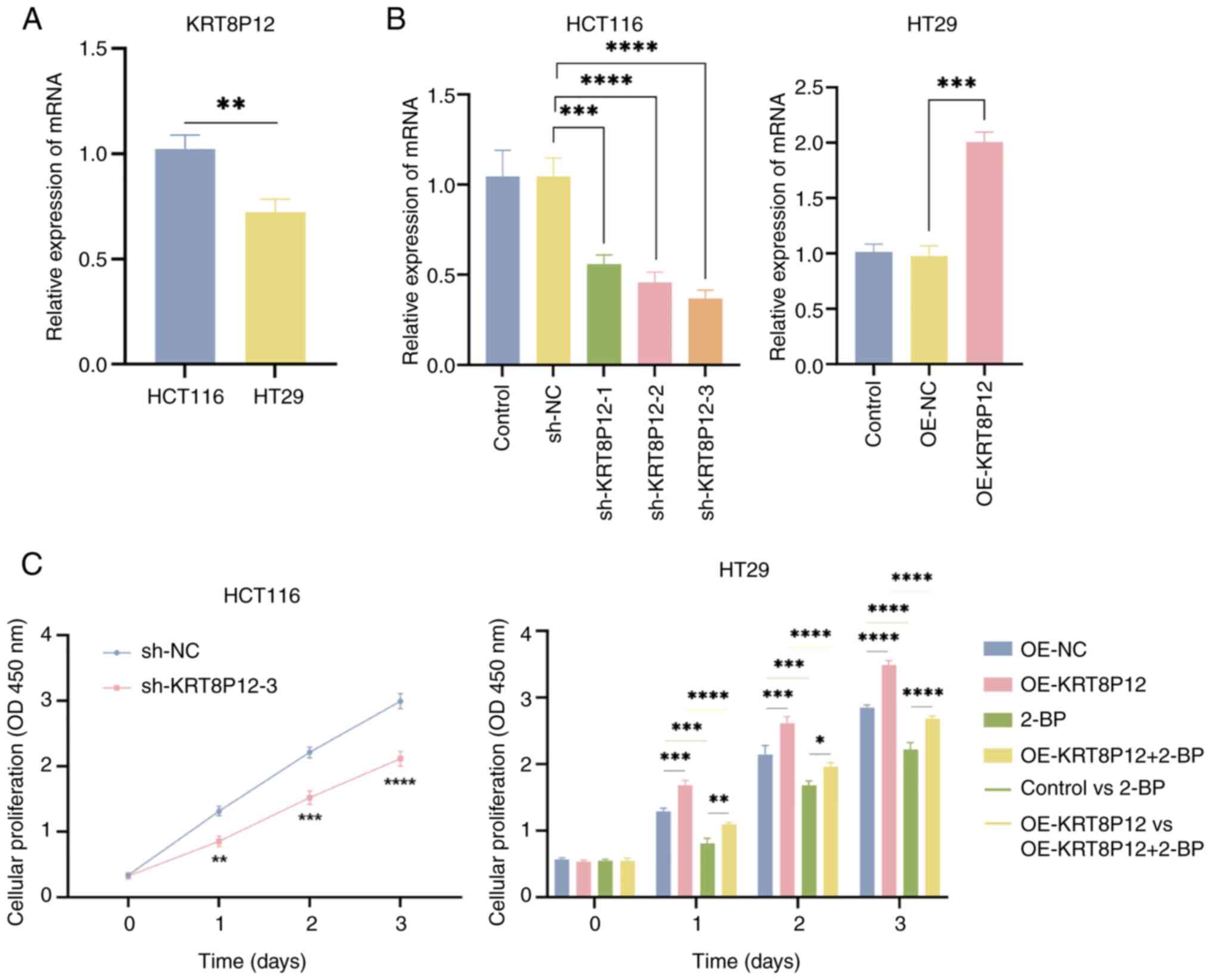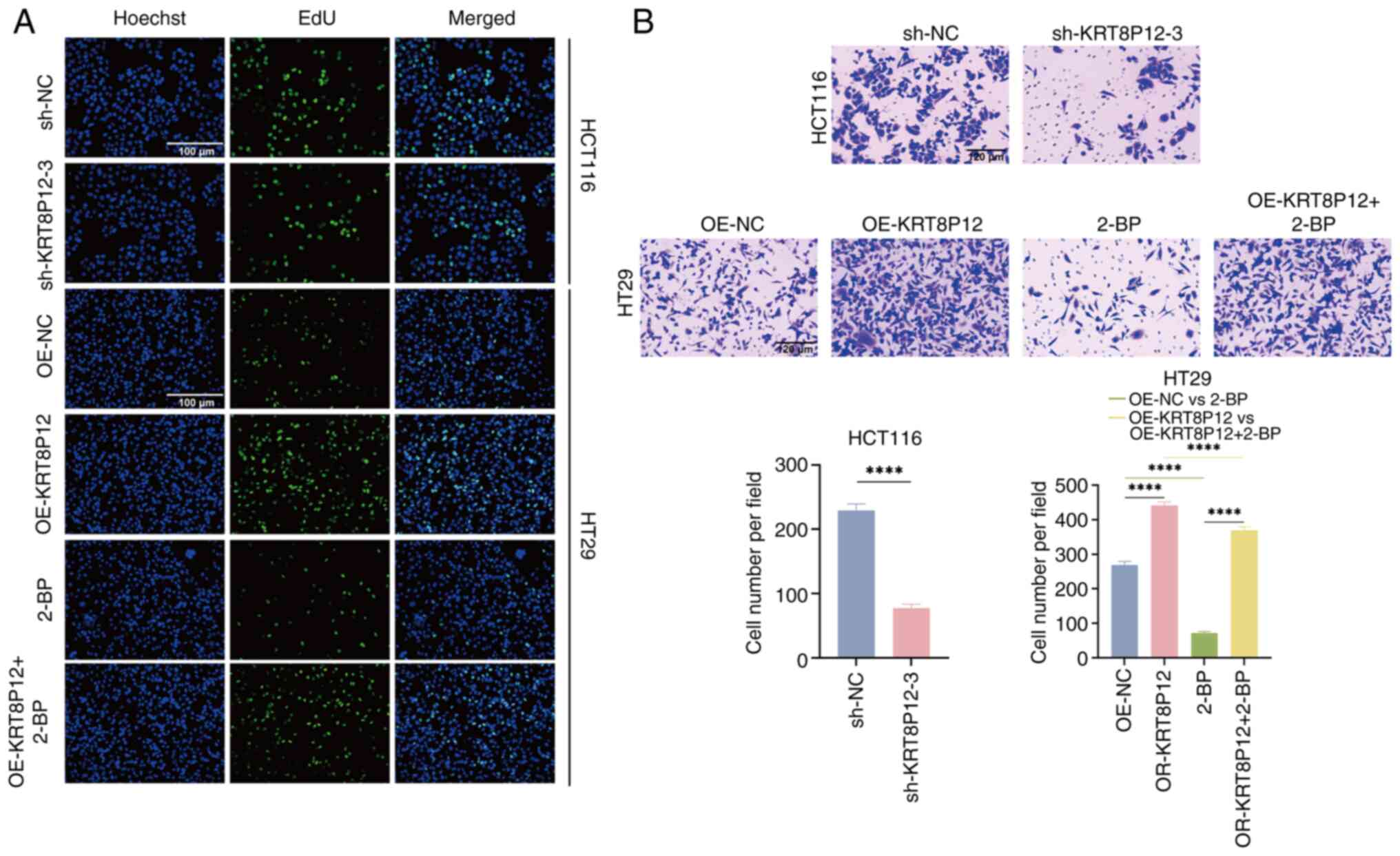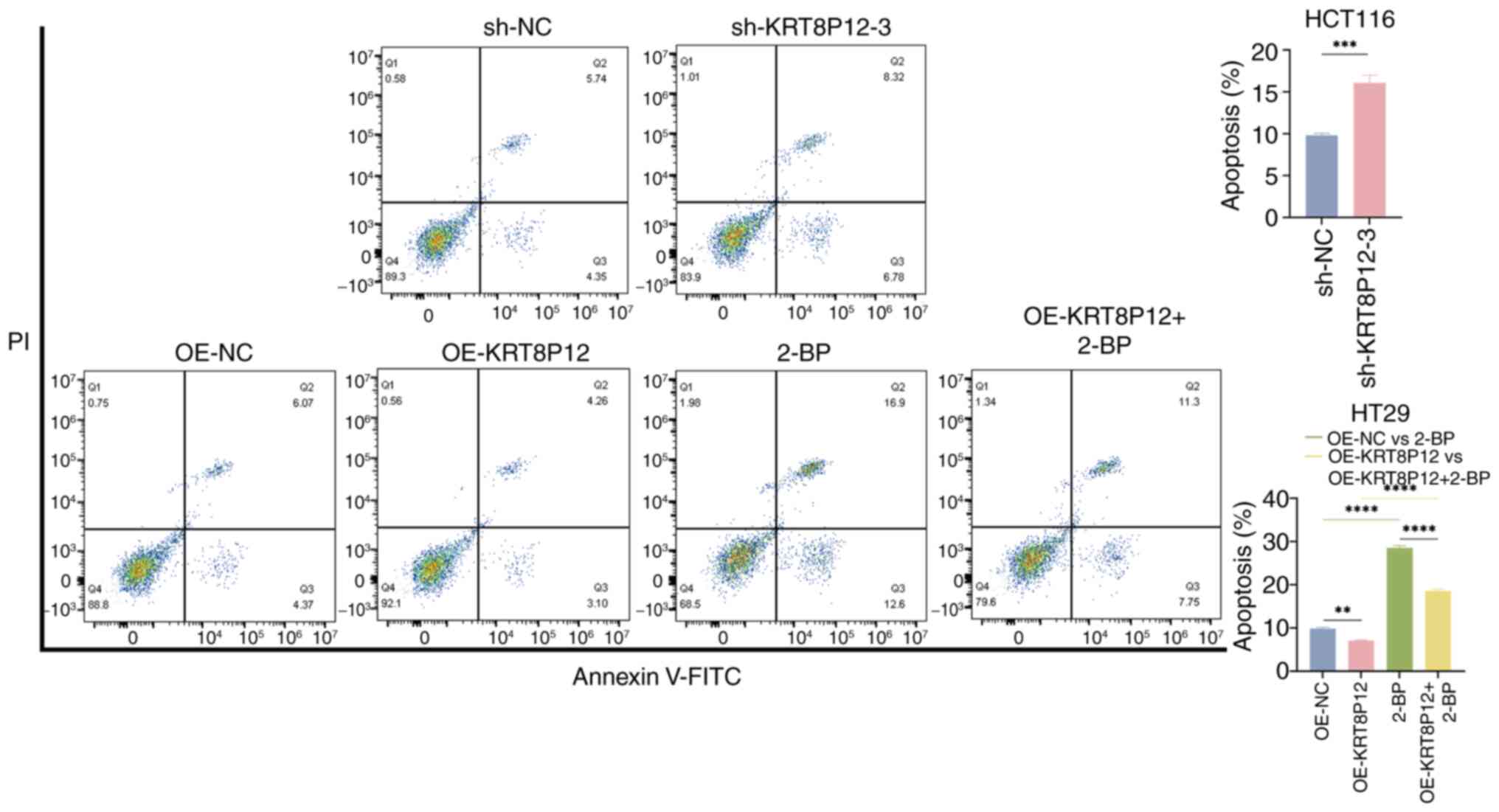|
1
|
Siegel RL, Giaquinto AN and Jemal A:
Cancer statistics, 2024. CA Cancer J Clin. 74:12–49. 2024.
View Article : Google Scholar : PubMed/NCBI
|
|
2
|
Benson AB III, Venook AP, Cederquist L,
Chan E, Chen YJ, Cooper HS, Deming D, Engstrom PF, Enzinger PC,
Fichera A, et al: Colon cancer, version 1.2017, NCCN clinical
practice guidelines in oncology. J Natl Compr Canc Netw.
15:370–398. 2017. View Article : Google Scholar : PubMed/NCBI
|
|
3
|
Saltz L: Systemic therapy for metastatic
colorectal cancer. J Natl Compr Canc Netw. 11 (Suppl 5):S649–S652.
2013. View Article : Google Scholar : PubMed/NCBI
|
|
4
|
Zhang D, Zhao K, Han T, Zhang X, Xu X, Liu
Z, Ren X, Zhang X, Lu Z and Qin C: Bisphenol A promote the cell
proliferation and invasion ability of prostate cancer cells via
regulating the androgen receptor. Ecotoxicol Environ Saf.
269:1158182024. View Article : Google Scholar : PubMed/NCBI
|
|
5
|
Marks KM, West NP, Morris E and Quirke P:
Clinicopathological, genomic and immunological factors in
colorectal cancer prognosis. Br J Surg. 105:e99–e109. 2018.
View Article : Google Scholar : PubMed/NCBI
|
|
6
|
Anaya YA, Bracho RP, Chauhan SC, Tripathi
MK and Bandyopadhyay D: Small Molecule B-RAF inhibitors as
anti-cancer therapeutics: Advances in discovery, development, and
mechanistic insights. Int J Mol Sci. 26:26762025. View Article : Google Scholar : PubMed/NCBI
|
|
7
|
Linder ME and Deschenes RJ:
Palmitoylation: Policing protein stability and traffic. Nat Rev Mol
Cell Biol. 8:74–84. 2007. View
Article : Google Scholar : PubMed/NCBI
|
|
8
|
Salaun C, Greaves J and Chamberlain LH:
The intracellular dynamic of protein palmitoylation. J Cell Biol.
191:1229–1238. 2010. View Article : Google Scholar : PubMed/NCBI
|
|
9
|
Tape CJ, Ling S, Dimitriadi M, McMahon KM,
Worboys JD, Leong HS, Norrie IC, Miller CJ, Poulogiannis G,
Lauffenburger DA and Jørgensen C: Oncogenic KRAS regulates tumor
cell signaling via stromal reciprocation. Cell. 165:18182016.
View Article : Google Scholar : PubMed/NCBI
|
|
10
|
Bivona TG: Dampening oncogenic RAS
signaling. Science. 363:1280–1281. 2019. View Article : Google Scholar : PubMed/NCBI
|
|
11
|
Galluzzo P, Caiazza F, Moreno S and Marino
M: Role of ERbeta palmitoylation in the inhibition of human colon
cancer cell proliferation. Endocr Relat Cancer. 14:153–167. 2007.
View Article : Google Scholar : PubMed/NCBI
|
|
12
|
Caiazza F, Galluzzo P, Lorenzetti S and
Marino M: 17Beta-estradiol induces ERbeta up-regulation via
p38/MAPK activation in colon cancer cells. Biochem Biophys Res
Commun. 359:102–107. 2007. View Article : Google Scholar : PubMed/NCBI
|
|
13
|
Schwab RHM, Amin N, Flanagan DJ, Johanson
TM, Phesse TJ and Vincan E: Wnt is necessary for mesenchymal to
epithelial transition in colorectal cancer cells. Dev Dyn.
247:521–530. 2018. View Article : Google Scholar : PubMed/NCBI
|
|
14
|
Klaus C, Schneider U, Hedberg C, Schütz
AK, Bernhagen J, Waldmann H, Gassler N and Kaemmerer E: Modulating
effects of acyl-CoA synthetase 5-derived mitochondrial Wnt2B
palmitoylation on intestinal Wnt activity. World J Gastroenterol.
20:14855–14864. 2014. View Article : Google Scholar : PubMed/NCBI
|
|
15
|
Dubois F, Leroy C, Simon V, Benistant C
and Roche S: YES oncogenic activity is specified by its SH4 domain
and regulates RAS/MAPK signaling in colon carcinoma cells. Am J
Cancer Res. 5:1972–1987. 2015.PubMed/NCBI
|
|
16
|
Draper JM and Smith CD: DHHC20: A human
palmitoyl acyltransferase that causes cellular transformation. Mol
Membr Biol. 27:123–136. 2010. View Article : Google Scholar : PubMed/NCBI
|
|
17
|
Rossin A, Durivault J, Chakhtoura-Feghali
T, Lounnas N, Gagnoux-Palacios L and Hueber AO: Fas palmitoylation
by the palmitoyl acyltransferase DHHC7 regulates Fas stability.
Cell Death Differ. 22:643–653. 2015. View Article : Google Scholar : PubMed/NCBI
|
|
18
|
Kristensen VN, Lingjærde OC, Russnes HG,
Vollan HK, Frigessi A and Børresen-Dale AL: Principles and methods
of integrative genomic analyses in cancer. Nat Rev Cancer.
14:299–313. 2014. View Article : Google Scholar : PubMed/NCBI
|
|
19
|
Rich JT, Neely JG, Paniello RC, Voelker
CC, Nussenbaum B and Wang EW: A practical guide to understanding
Kaplan-Meier curves. Otolaryngol Head Neck Surg. 143:331–336. 2010.
View Article : Google Scholar : PubMed/NCBI
|
|
20
|
Yu G, Wang LG, Han Y and He QY:
clusterProfiler: An R package for comparing biological themes among
gene clusters. OMICS. 16:284–387. 2012. View Article : Google Scholar : PubMed/NCBI
|
|
21
|
Mayakonda A, Lin DC, Assenov Y, Plass C
and Koeffler HP: Maftools: Efficient and comprehensive analysis of
somatic variants in cancer. Genome Res. 28:1747–1756. 2018.
View Article : Google Scholar : PubMed/NCBI
|
|
22
|
Chalmers ZR, Connelly CF, Fabrizio D, Gay
L, Ali SM, Ennis R, Schrock A, Campbell B, Shlien A, Chmielecki J,
et al: Analysis of 100,000 human cancer genomes reveals the
landscape of tumor mutational burden. Genome Med. 9:342017.
View Article : Google Scholar : PubMed/NCBI
|
|
23
|
Mermel CH, Schumacher SE, Hill B, Meyerson
ML, Beroukhim R and Getz G: GISTIC2.0 facilitates sensitive and
confident localization of the targets of focal somatic copy-number
alteration in human cancers. Genome Biol. 12:R412011. View Article : Google Scholar : PubMed/NCBI
|
|
24
|
Powers RK, Goodspeed A, Pielke-Lombardo H,
Tan AC and Costello JC: GSEA-InContext: Identifying novel and
common patterns in expression experiments. Bioinformatics.
34:i555–i564. 2018. View Article : Google Scholar : PubMed/NCBI
|
|
25
|
Newman AM, Steen CB, Liu CL, Gentles AJ,
Chaudhuri AA, Scherer F, Khodadoust MS, Esfahani MS, Luca BA,
Steiner D, et al: Determining cell type abundance and expression
from bulk tissues with digital cytometry. Nat Biotechnol.
37:773–782. 2019. View Article : Google Scholar : PubMed/NCBI
|
|
26
|
Jiang P, Gu S, Pan D, Fu J, Sahu A, Hu X,
Li Z, Traugh N, Bu X, Li B, et al: Signatures of T cell dysfunction
and exclusion predict cancer immunotherapy response. Nat Med.
24:1550–1558. 2018. View Article : Google Scholar : PubMed/NCBI
|
|
27
|
Jiang P, Gu S, Pan D, Fu J, Sahu A, Hu X,
Li Z, Traugh N, Bu X, Li B, et al: Signatures of T cell dysfunction
and exclusion predict cancer immunotherapy response. Nat Med.
24:1550–1558. 2018. View Article : Google Scholar : PubMed/NCBI
|
|
28
|
Hoshida Y, Brunet JP, Tamayo P, Golub TR
and Mesirov JP: Subclass mapping: Identifying common subtypes in
independent disease data sets. PLoS One. 2:e11952007. View Article : Google Scholar : PubMed/NCBI
|
|
29
|
Geeleher P, Cox N and Huang RS:
pRRophetic: An R package for prediction of clinical
chemotherapeutic response from tumor gene expression levels. PLoS
One. 9:e1074682014. View Article : Google Scholar : PubMed/NCBI
|
|
30
|
Livak KJ and Schmittgen TD: Analysis of
relative gene expression data using real-time quantitative PCR and
the 2(−Delta Delta C(T)) method. Methods. 25:402–408. 2001.
View Article : Google Scholar : PubMed/NCBI
|
|
31
|
Sebastian J and Rathinasamy K:
Microtubules and cell division: Potential pharmacological targets
in cancer therapy. Curr Drug Targets. 24:889–918. 2023. View Article : Google Scholar : PubMed/NCBI
|
|
32
|
Chen L, Chen WD, Xu YX, Ren YY, Zheng C,
Lin YY and Zhou JL: Strategies for enhancing non-small cell lung
cancer treatment: Integrating Chinese herbal medicines with
epidermal growth factor receptor-tyrosine kinase inhibitors
therapy. Eur J Pharmacol. 980:1768712024. View Article : Google Scholar : PubMed/NCBI
|
|
33
|
Lin JC, Oludare A and Jung H: Connecting
dots between nucleotide biosynthesis and DNA lesion repair/bypass
in cancer. Biosci Rep. 44:BSR202313822024. View Article : Google Scholar : PubMed/NCBI
|
|
34
|
Jordheim LP: Clinical use of biomarkers in
the field of cytotoxic nucleoside analogues. Nucleosides
Nucleotides Nucleic Acids. 43:822–830. 2024. View Article : Google Scholar : PubMed/NCBI
|
|
35
|
Conn E, Hour S, Allegakoen D, Graham G,
Petro J, Kouassi-Brou M, Hong SH, Selvanathan S, Çelik H, Toretsky
J and Üren A: Development of an Ewing sarcoma cell line with
resistance to EWS-FLI1 inhibitor YK-4-279. Mol Med Rep.
21:1667–1675. 2020.PubMed/NCBI
|
|
36
|
Banyal A, Tiwari S, Sharma A, Chanana I,
Patel SKS, Kulshrestha S and Kumar P: Vinca alkaloids as a
potential cancer therapeutics: Recent update and future challenges.
3 Biotech. 13:2112023. View Article : Google Scholar : PubMed/NCBI
|
|
37
|
Sun K, Sun Z, Zhao F, Shan G and Meng Q:
Recent advances in research of colchicine binding site inhibitors
and their interaction modes with tubulin. Future Med Chem.
13:839–858. 2021. View Article : Google Scholar : PubMed/NCBI
|
|
38
|
Sun J, Yuan H, Sun L, Zhao L, Wang Y, Hou
C, Zhang H, Lv P, Yang G, Zhang N, et al: Tumor-intrinsic PRMT5
upregulates FGL1 via methylating TCF12 to inhibit CD8+
T-cell-mediated antitumor immunity in liver cancer. Acta Pharm Sin
B. 15:188–204. 2025. View Article : Google Scholar : PubMed/NCBI
|
|
39
|
Eng C, Yoshino T, Ruíz-García E, Mostafa
N, Cann CG, O'Brian B, Benny A, Perez RO and Cremolini C:
Colorectal cancer. Lancet. 404:294–310. 2024. View Article : Google Scholar : PubMed/NCBI
|
|
40
|
Liu Z, Xiao M, Mo Y, Wang H, Han Y, Zhao
X, Yang X, Liu Z and Xu B: Emerging roles of protein palmitoylation
and its modifying enzymes in cancer cell signal transduction and
cancer therapy. Int J Biol Sci. 18:3447–3457. 2022. View Article : Google Scholar : PubMed/NCBI
|
|
41
|
Zhu J, Cao X, Chen Z, Lai B, Xi L, Zhang
J, Zhu S, Qi S, Liang Y, Cao F, et al: Inhibiting S-palmitoylation
arrests metastasis by relocating Rap2b from plasma membrane in
colorectal cancer. Cell Death Dis. 15:6752024. View Article : Google Scholar : PubMed/NCBI
|
|
42
|
Kong Y, Liu Y, Li X, Rao M, Li D, Ruan X,
Li S, Jiang Z and Zhang Q: Palmitoylation landscapes across human
cancers reveal a role of palmitoylation in tumorigenesis. J Transl
Med. 21:8262023. View Article : Google Scholar : PubMed/NCBI
|
|
43
|
Tsai MY, Lu CK, Shu LH, Liu HT, Wu YH, Lin
YS, Yang YH, Shih WT, Lee IY, Wu YH and Wu CY: Antrodia
cinnamomea formula suppresses prostate cancer progression via
immune modulation and PD-1/PD-L1 pathway inhibition. Int J Mol Sci.
26:26842025. View Article : Google Scholar : PubMed/NCBI
|
|
44
|
Lee TA, Tsai EY, Liu SH, Hsu Hung SD,
Chang SJ, Chao CH, Lai YJ, Yamaguchi H and Li CW:
Post-translational modification of PD-1: Potential targets for
cancer immunotherapy. Cancer Res. 84:800–807. 2024. View Article : Google Scholar : PubMed/NCBI
|
|
45
|
Yao H, Lan J, Li C, Shi H, Brosseau JP,
Wang H, Lu H, Fang C, Zhang Y, Liang L, et al: Inhibiting PD-L1
palmitoylation enhances T-cell immune responses against tumours.
Nat Biomed Eng. 3:306–317. 2019. View Article : Google Scholar : PubMed/NCBI
|
|
46
|
Wang Q, Wang J, Yu D, Zhang Q, Hu H, Xu M,
Zhang H, Tian S, Zheng G, Lu D, et al: Benzosceptrin C induces
lysosomal degradation of PD-L1 and promotes antitumor immunity by
targeting DHHC3. Cell Rep Med. 5:1013572024. View Article : Google Scholar : PubMed/NCBI
|
|
47
|
Wang W, He J, Lu H, Kong Q and Lin S: KRT8
and KRT19, associated with EMT, are hypomethylated and
overexpressed in lung adenocarcinoma and link to unfavorable
prognosis. Biosci Rep. 40:BSR201934682020. View Article : Google Scholar : PubMed/NCBI
|
|
48
|
Zhang X, Hou J, Zhou G, Wang H and Wu Z:
zDHHC3-mediated S-palmitoylation of SLC9A2 regulates apoptosis in
kidney clear cell carcinoma. J Cancer Res Clin Oncol. 150:1942024.
View Article : Google Scholar : PubMed/NCBI
|
|
49
|
Yin Y, Yang X, Cheng Z, Wang H, Lei J,
Wang D, Wang P, Li B, Mi J and Yuan Q: Identification of
extracellular matrix-related biomarkers in colon adenocarcinoma by
bioinformatics and experimental validation. Front Immunol.
15:13715842024. View Article : Google Scholar : PubMed/NCBI
|
|
50
|
Tang L, Yu S, Zhang Q, Cai Y, Li W, Yao S
and Cheng H: Identification of hub genes related to CD4(+) memory T
cell infiltration with gene co-expression network predicts
prognosis and immunotherapy effect in colon adenocarcinoma. Front
Genet. 13:9152822022. View Article : Google Scholar : PubMed/NCBI
|
|
51
|
Luo SY, Sit KY, Sihoe AD, Suen WS, Au WK,
Tang X, Ma ES, Chan WK, Wistuba II, Minna JD, et al: Aberrant large
tumor suppressor 2 (LATS2) gene expression correlates with EGFR
mutation and survival in lung adenocarcinomas. Lung Cancer.
85:282–292. 2014. View Article : Google Scholar : PubMed/NCBI
|
|
52
|
Karantza V: Keratins in health and cancer:
More than mere epithelial cell markers. Oncogene. 30:127–138. 2011.
View Article : Google Scholar : PubMed/NCBI
|















